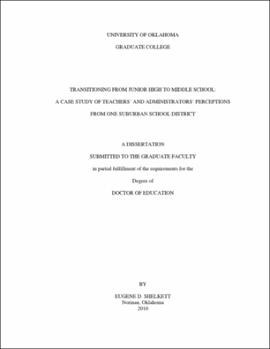| dc.description.abstract | The purpose of this study was to analyze through a set of interpretive and pragmatic theoretical lenses the perceptions of the middle school teachers, principals, and administrators of one school district's transition from junior high school to middle school. The junior high school was conceived primarily as a downward extension of secondary education organized by subjects and departments with a grade-level configuration that usually includes ninth grade. The middle school was conceived as a more child-centered institution with responsive practices and a more varied curriculum. Such practices address curriculum, pedagogy, social elements, emotional needs, physical needs, professional development, and interdisciplinary teaming. The theoretical framework of this study was the individual perception to understanding the effectiveness of transitioning from junior high schools to middle schools and generated the overall research question: In one suburban district, how did the teacher's, principal's, and central office administrators' perceptions of the organizational transition from junior high to middle school compare and contrast? A case study was chosen for this research that relied upon surveys, interviews, and document analysis to address the research question. The study showed there were many similarities in the perceptions of teachers, principals, and administrators with the implementation of middle school components. These include appropriate planning times, staff competency on middle school education, a teaching staff skilled in the ability to work with students, and parents receiving regular feedback regarding the student's progress. The results of the study also showed a difference in the perception of teacher involvement; staff moral; staff cooperation and support of each other; and use of the advisory component of the middle school concept. | |
